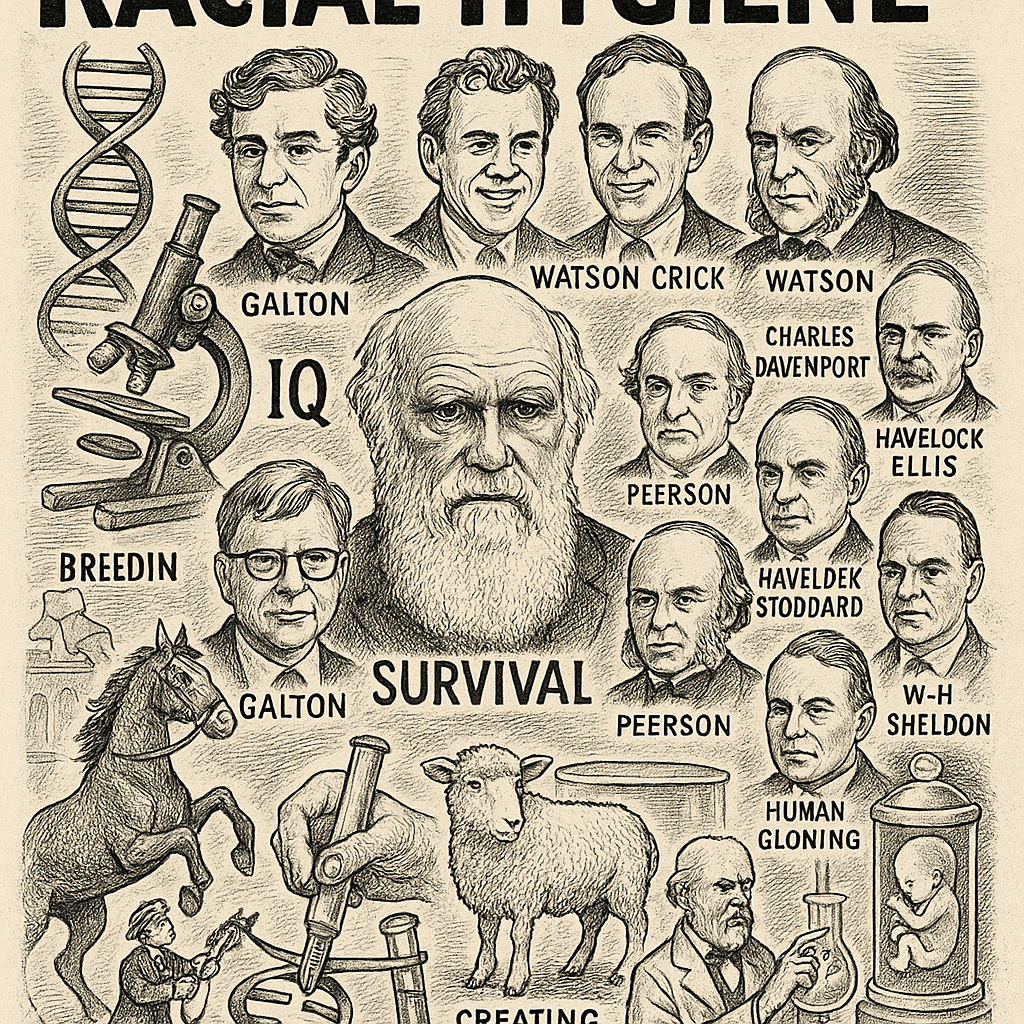Thrival of the Unfittest – Eugenicist Warnings
Here is a list of older (late 19th to early 20th century) eugenicists and social theorists who warned about the dangers, in their view, of allowing the “weak,” “meek,” or “unfit” to reproduce or flourish, often claiming that such trends would lead to societal degeneration:
1. Francis Galton (1822–1911)
- Key Idea: Founder of eugenics; advocated improving the human race by encouraging reproduction among the “fit” and discouraging it among the “unfit.”
- Quote: “What nature does blindly, slowly, and ruthlessly, man may do providently, quickly, and kindly.”
- Concern: He believed that modern medicine and charity were allowing those with inferior traits to survive and reproduce, weakening the population.
2. Charles Darwin (1809–1882) (Not a eugenicist, but often cited)
- Key Idea: Though not a proponent of eugenics, his writings on natural selection inspired later eugenic thinkers.
- Quote from The Descent of Man (1871):
“We civilised men, on the other hand, do our utmost to check the process of elimination… Thus the weak members of civilized societies propagate their kind.”
- Concern: He observed that humanitarian efforts could interfere with natural selection.
3. Herbert Spencer (1820–1903)
- Key Idea: Coined the term “survival of the fittest.” Advocated social Darwinism — letting natural selection play out in human societies.
- Quote: “The ultimate result of shielding men from the effects of folly is to fill the world with fools.”
- Concern: He argued that helping the poor and disabled interfered with evolution.
4. Karl Pearson (1857–1936)
- Key Idea: Statistician and eugenicist; disciple of Galton.
- Quote: “Degeneracy is not arrested by charity, but fostered by it.”
- Concern: Claimed that unchecked reproduction among the “unfit” would swamp the healthy genetic stock of the nation.
5. Madison Grant (1865–1937)
- Key Idea: American lawyer and eugenicist; wrote The Passing of the Great Race (1916).
- Quote: “The humanitarian sentiments now so generally prevalent may result in a perpetuation of the weak.”
- Concern: He believed Nordic racial stock was being diluted by inferior immigrants and the unfit.
6. Charles Davenport (1866–1944)
- Key Idea: American biologist; leader of the eugenics movement in the U.S.
- Quote: “Society must protect itself; as it now does not, against the propagation of the defective.”
- Concern: Advocated forced sterilization and institutionalization of the “unfit.”
7. Havelock Ellis (1859–1939)
- Key Idea: English physician, psychologist, and eugenicist.
- Quote: “Eugenics is the self-direction of human evolution.”
- Concern: Warned that modern society was sustaining lives of those evolution would otherwise weed out.
8. Lothrop Stoddard (1883–1950)
- Key Idea: American eugenicist and racial theorist; author of The Revolt Against Civilization.
- Quote: “The under-man… is everywhere rising against the man of superior type.”
- Concern: Feared a decline in civilization due to rising power of the “unfit” masses.
9. W.H. Sheldon (1898–1977)
- Key Idea: Known for somatotyping (body-type classification) and linking body types to intelligence and criminality.
- Concern: Implicitly promoted the idea that social policies should favor the biologically “superior.”
| Name | Lifespan | Core Beliefs / Warnings | View of “Unfit” Flourishing | Proposed Interventions | Political / Cultural Influence |
|---|---|---|---|---|---|
| Francis Galton | 1822–1911 | Coined “eugenics”; believed civilization interferes with natural selection | Dangerous | Positive eugenics; selective breeding | British scientific elite |
| Charles Darwin | 1809–1882 | Observed survival of “weak” in society due to humanitarian aid; not a eugenicist | Concerned | None (descriptive, not prescriptive) | Influenced all later eugenicists |
| Herbert Spencer | 1820–1903 | Applied evolution to society; warned welfare would breed dependency | Inevitable without reform | Laissez-faire; anti-charity, anti-welfare | Libertarian individualism |
| Karl Pearson | 1857–1936 | Warned that charity promotes degeneration | Actively harmful | State-directed eugenics; statistical analysis | British eugenics movement |
| Madison Grant | 1865–1937 | Claimed weak and immigrant races diluted Nordic bloodlines | Catastrophic | Immigration restriction, sterilization | U.S. immigration policy (1920s) |
| Charles Davenport | 1866–1944 | Feared the “unfit” would genetically overwhelm society | Imminent threat | Sterilization, segregation, institutionalization | American Eugenics Record Office |
| Havelock Ellis | 1859–1939 | Believed eugenics was humanitarian and rational; worried about reversing evolution | A grave concern | Education, selective reproduction | Progressive elites in Britain |
| Lothrop Stoddard | 1883–1950 | Claimed global rise of “under-man” threatened white civilization | Existential threat | Racial segregation, immigration restriction | Influenced Nazi racial theories |
| W.H. Sheldon | 1898–1977 | Linked body type to intelligence and behavior; implied biological caste system | Undermines meritocracy | Implied selection via classification | Academic, early criminology |

Visited 4 times, 1 visit(s) today